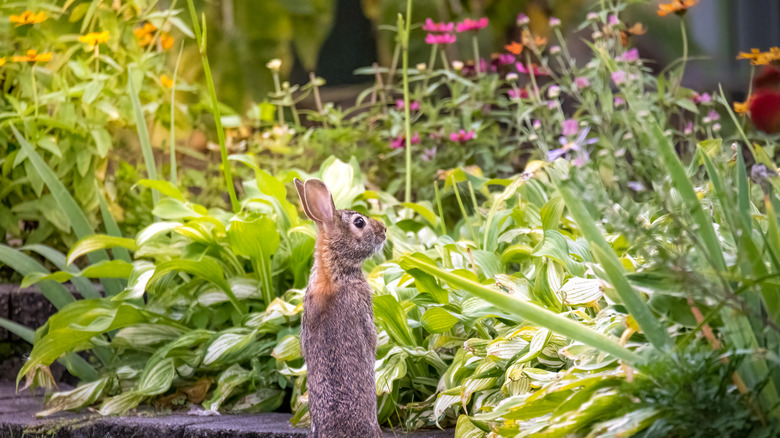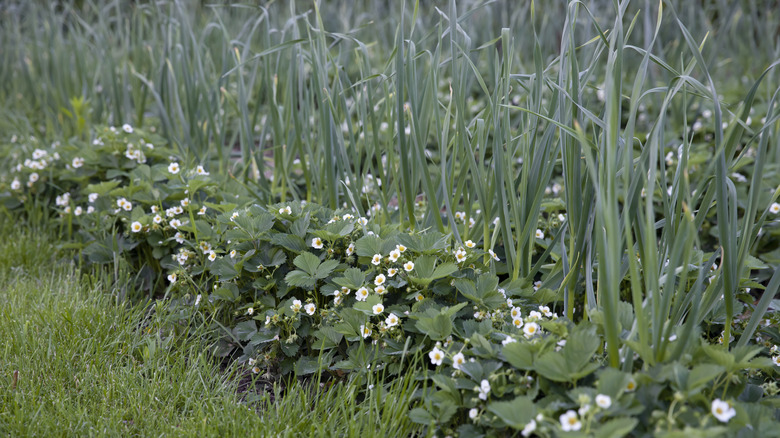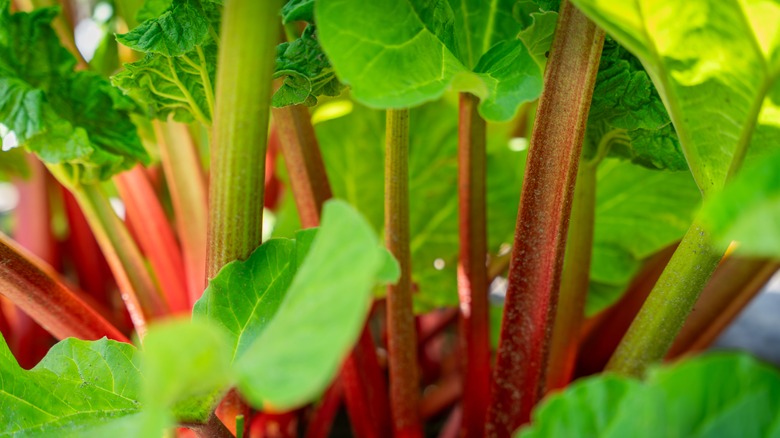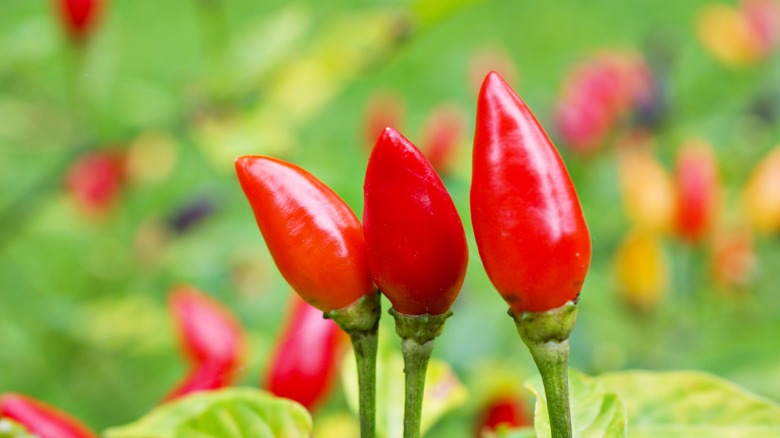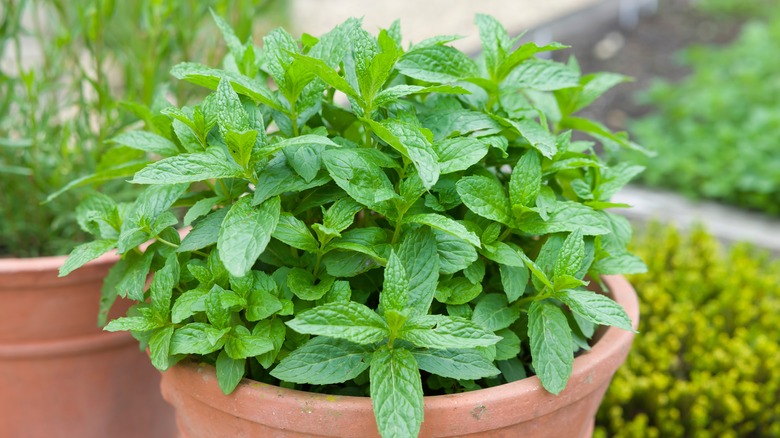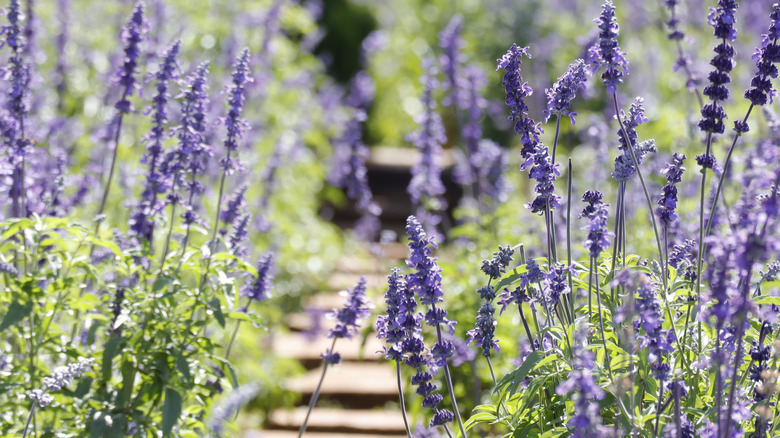If Rabbits Are Destroying Your Garden, Try These Rabbit-Resistant Plants
If you have the space, growing a garden in your yard has tons of benefits. It allows you to grow your own food, gives you a hobby that improves your mood and health, and can make a nice decoration when you invite people to hang out. However, they're a lot of work — they require constant weeding, and it's an uphill battle to keep your plants growing without an annoying pest coming to eat everything. Rabbits especially are a problem. Fencing and plastic forks do work to discourage these critters, but growing rabbit-resistant flora is your best bet. Some of the most effective deterrents are garlic, rhubarb, hot peppers, mint, and sage.
Before you start picking out your favorites, though, know that even the best species aren't completely rabbit-proof, so it's a good idea to also include other repellents for the best results. Additionally, young rabbits are more curious than adults and don't yet know which foods they do and don't like. If they start to explore, they may still come and nibble on your vegetation — regardless of the species. Sometimes they also get used to a smell or plant and are no longer deterred from it. It's a good idea to change up what's in your garden every season to ensure maximum effectiveness.
Garlic
There are many reasons why growing garlic in your garden is beneficial. The plant is pretty fragrant and works well on its own to keep rabbits away. It's also a companion plant for tomatoes, so you can seed it in the same bed to ensure the critters don't get to your delicious fruits. Not only do they hate the smell, but eating them can trigger pretty severe reactions. This means most instinctively know to avoid these plants, which is why they are some of the best options for keeping the animals at bay. For example, in the image above, garlic is planted alongside strawberries, keeping the fruit safe from rabbits.
On top of clearing out these pesky animals, the plant has a few other purposes. Garlic keeps away many different pests, like armyworms, mosquitoes, flies, and aphids. It's also used in various recipes and has several health benefits including boosting the immune system and lowering blood pressure. This is the perfect plant to have around if you enjoy cooking or staying healthy while protecting your yard from pests. You can also create garlic sprays by steeping smashed cloves in water overnight — perfect to keep on hand during periods when the plant isn't growing.
Rhubarb
Generally, fruits and vegetables will be snapped up by rabbits, deer, and birds if you don't protect them. However, there is at least one commonly eaten plant that keeps rabbits away: rhubarb. It's a slightly more niche garden vegetable, popular primarily in Britain and the United States' Midwest, and is often used to make desserts like pies and candies.
If you have children or pets, you might want to keep this plant out of their way. Though it's delicious once prepped and cooked properly, the stalk is the only edible portion. The leaves contain high amounts of oxalic acid and are pretty dangerous when eaten in large enough quantities.
As for how it keeps away rabbits, it's a little unclear. There are reports that rhubarb is toxic to them like it is to people and pets, so they avoid eating any. Others say it's strong scent repels bunnies, though it's not a plant people can smell easily until it's cooked. Whatever the reason, most rabbits choose to avoid the veggie unless there's no other option.
Hot Peppers
The hot pepper is another rabbit-resistant plant that's perfect to grow in your garden. Rabbits and deer don't enjoy the spicy taste and smell, so grow them near your other fruits and vegetables to deter pests. There's no specific species you have to pick, either, as long as it's sufficiently hot enough.
There are some things to keep in mind, though. Since it's really only the fruit that keeps animals at bay, there's a chance they'll wreak havoc on your garden before they have time to grow. Additionally, if the fruits aren't fragrant or hot enough, they might not be effective at scaring off rabbits. For example, bell peppers won't deter them and may actually draw them in because of their sweet taste. And sometimes, even when hot peppers are growing, your annoying bunny neighbors may still enjoy the leaves and stems.
There are a couple other reasons to grow hot peppers, even if you don't use them much in your cooking. For one, they can be dried and sprinkled around your garden to keep away pests. They can also be simmered in water and turned into a spray, so they're a great long-term investment.
Mint
Mint is incredibly easy to grow — it basically takes care of itself. The only problem is that it's a rather feral plant. When growing it in your yard or even in a pot outside, it can quickly take over an entire garden. If you're going to plant mint, you need to keep a vigilant eye on it and be ready to pluck any seedlings popping up where they shouldn't or it will quickly get out of hand.
That said, if you don't mind keeping a close watch on this plant to ensure it doesn't spread out, it's incredibly useful to have around your garden. Not only can you use mint in a variety of dishes and drinks, but it also discourages pests. With rabbits, the mint should push them to forage in other areas. If you have parts of your garden where you aren't eager to plant mint, you can also create a spray with the leaves or essential oils and use it around the rest of your yard.
Like most other rabbit deterrents, mint works so well because of its strong smell. While it's a scent many people enjoy and find refreshing, for rabbits, it's incredibly strong and rather unpleasant. The smell only works in a small range though. For maximum effectiveness, mint needs to be planted in a barrier around your other more susceptible plants or grown alongside them in a bed.
Sage
Sage is one plant that keeps both deer and rabbits away, and certain species can also be used for cooking. If you pack it on your next camping trip, burning sage in your fire may also keep away mosquitoes. There are hundreds of species, and most of them tend to work well at discouraging pests. The major exception appears to be Salvia splendens, or scarlet sage. Instead of being woody and tough, it's considered a pretty tender plant, and is therefore more liked by animals like rabbits.
Purple sage and common sage are two species commonly used to deter bunnies from gardens. However, depending on where you live and the tenaciousness of your wild rabbit population, you may have to play around with various types until you find what works, or even use a mix of several. It's generally the strong smell of the plant that deters rabbits, so focus primarily on heavily fragrant sage, but tougher stems don't hurt either. Additionally, like with many other plants, check how certain sage types do in your zone. Some may be pretty annuals in one area, but turn into large and woody plants in others.
There are a few other benefits to growing sage in your garden as well. They're quite beautiful flowers, and with so many options, you can easily find one that fits in your aesthetic. Sage can also be placed alongside other plants — it attracts pollinators when they bloom, attracting and helping animals like bees, hummingbirds, and butterflies.
